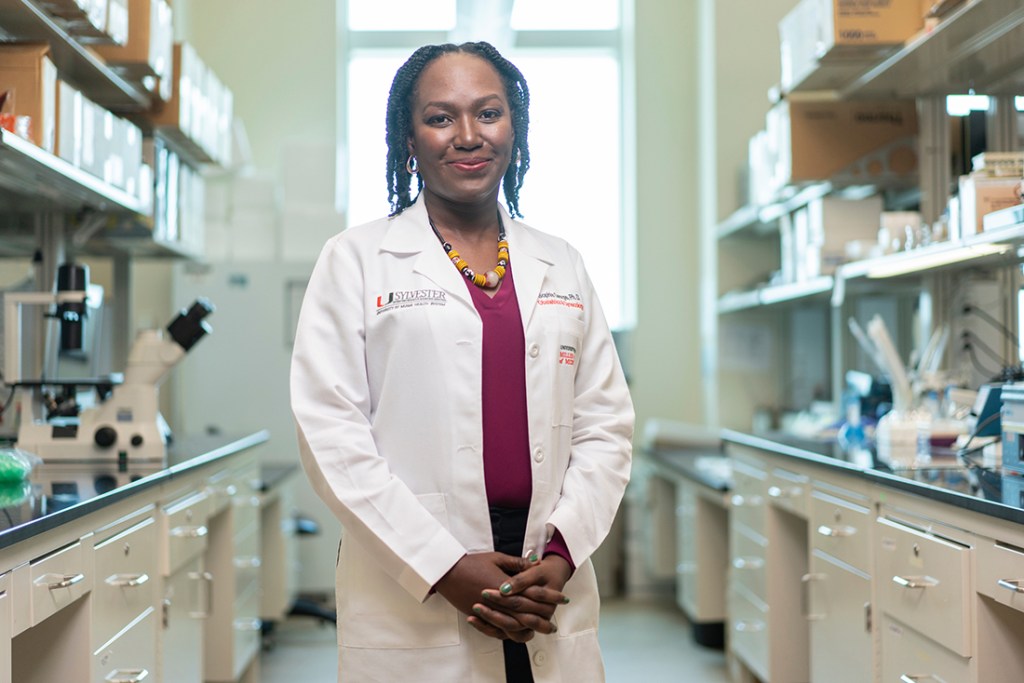Cervical Cancer: Elimination is Possible
On Cervical Cancer Elimination Day of Action, Sylvester researchers underscore their efforts to help eradicate the disease worldwide, through vaccination, screening, treatment, and managed and palliative care.
Cervical cancer is a unique kind of cancer. It is preventable, can be detected early and is treatable. But eliminating the disease can only happen if women have equitable access to medical care.
Sylvester Comprehensive Cancer Center, part of the University of Miami Miller School of Medicine, is a leading player in addressing health hurdles to help women access important tools to stop the development and progression of this disease.

“We’re attacking the problem of disparities in cervical cancer testing and care from every possible angle,” said Sophia George, Ph.D., Sylvester’s associate director of the office of Belonging and Inclusive Excellence (OBIE) and associate professor of obstetrics, gynecology and reproductive sciences in the Miller School’s Division of Gynecologic Oncology.
That includes community outreach in South Florida, training fellows from other parts of the world and conducting genetic research to identify the types of cervical cancer specific to populations.
Cervical Cancer is a Worldwide Problem
According to the CDC, about 11,500 new cases of cervical cancer are diagnosed and about 4,000 women die of the disease each year in the U.S. Worldwide, it is the fourth-most common cancer in women, with about 604,000 new cases and 342,000 deaths in 2020, according to the World Health Organization (WHO).
WHO established Nov. 17 as Cervical Cancer Elimination Day of Action and designated the disease a public health problem. Now in its third year, WHO’s awareness day and global strategy to eliminate cervical cancer includes 194 countries.

Almost all cases of cervical cancer are caused by the human papillomavirus (HPV). In addition to having a vaccine available that can be used against it, HPV can also be detected through testing for the virus itself or for abnormal cells on the cervix via a Pap smear screening. If pre-cancerous cells are detected, they can easily be removed to stop cervical cancer before it starts.
The tests and procedures are not equally available to all women. Cervical cancer still disproportionally affects those in low- and middle-income countries. Rates are also higher nationwide in women who face hurdles to care like socioeconomic issues, fears stemming from an undocumented status and avoidance of doctors and hospitals because of cost or a language barrier.
These health disparities are reflected in Sylvester’s catchment area, especially among Black and Hispanic women, Dr. George said.
Sylvester’s Global Efforts Against Cervical Cancer
In 2021, WHO partnered with Sylvester in a first-of-its-kind collaboration to eliminate cervical cancer. The goal is to create a world free of cervical cancer through vaccination, screening, treatment, and managed and palliative care.

Sylvester is training fellows from other parts of the world in gynecology oncology care, including for cervical cancer. These global efforts occur in countries that don’t have gynecological oncologists at all, said Matthew P. Schlumbrecht, M.D., M.P.H., a Miller School professor of clinical obstetrics, gynecology, and reproductive sciences and vice chair of global and community health. Dr. Schlumbrecht is also the international supervisor for the program, which is currently located in Nigeria and the Bahamas.
“The goal of the training program is very simply to increase the number of gynecological oncologists around the world,” he said.
All fellows spend at least three months in Miami in what Dr. Schlumbrecht calls “observerships” with the division of gynecological oncology. They also take courses in clinical trial design and management and work with Sylvester to develop and implement research at their home institutions.
Community Partnerships for Cancer Prevention
Locally, Sylvester has been building partnerships with key community stakeholders who “deeply understand the complex, often multilevel, challenge around cancer prevention,” said Erin Kobetz, Ph.D., M.P.H., associate director, community outreach and engagement at Sylvester and the John K. and Judy H. Schulte Senior Endowed Chair in Cancer Research.

Dr. Kobetz’s team at Sylvester holds listening sessions across South Florida to understand needs and determine the pathways to encourage screenings. The sessions prompted a self-sampling method for HPV screening, which is now used and addresses community concerns about provider-collected screenings. Self-sampling is used on Sylvester’s mobile Game Changer vehicles that introduce cancer screenings and health information to underserved communities in South Florida.
Sylvester also uses a proprietary tool called SCAN360 to map the distribution of cervical cancer and other gynecologic cancers throughout South Florida. That helps identify higher-than-expected rates of cancers and the areas that need more outreach. SCAN360 helps determine the locations of Game Changer events as Dr. Kobetz’s team considers the needs of each community and Sylvester’s ongoing research.
“Together, we then structure education and screening activities that circumvent these barriers,” Dr. Kobetz said.
The data collected through the Game Changer vehicles informs research and also updates the SCAN360 for even greater accuracy in Sylvester’s catchment areas.
Through all these different bands of work, Dr. George expects Sylvester to continue to change people’s lives.
“We continue to engage with our community and develop clinical trials and research projects that are reflective of the burden of this disease on those we serve,” she said.
Tags: Cervical cancer, Department of Obstetrics Gynecology and Reproductive Sciences, Dr. Erin Kobetz, Dr. Matthew Schlumbrecht, Dr. Sophia George, healthcare access, Sylvester Comprehensive Cancer Center


